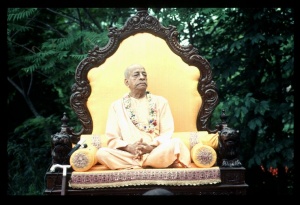SB 10.88.1: Difference between revisions
m (1 revision(s)) |
(Vanibot #0018 edit: make synonym terms in Sanskrit italic in SB - Vanisource) |
||
| Line 1: | Line 1: | ||
{{info | {{info | ||
|speaker=King | |speaker=King Parīkṣit | ||
|listener= | |listener=Śukadeva Gosvāmī | ||
}} | }} | ||
[[Category:Srimad-Bhagavatam - Canto 10 Chapter 88|s01]] | |||
[[Category:Bhagavatam Verses Spoken by Pariksit Maharaja - Vanisource|108801]] | |||
<div style="float:left">'''[[Srimad-Bhagavatam]] - [[SB 10|Tenth Canto]] - [[SB 10.88: Lord Siva Saved from Vrkasura|Chapter 88: Lord Śiva Saved from Vṛkāsura]]'''</div> | |||
<div style="float:right">[[File:Go-previous.png|link=SB 10.88 Summary]] '''[[SB 10.88 Summary]] - [[SB 10.88.2]]''' [[File:Go-next.png|link=SB 10.88.2]]</div> | |||
{{RandomImage}} | |||
{{SBnotice}} | |||
==== TEXT 1 ==== | ==== TEXT 1 ==== | ||
<div | <div class="verse"> | ||
śrī-rājovāca | :śrī-rājovāca | ||
devāsura-manuṣyesu | :devāsura-manuṣyesu | ||
ye bhajanty aśivaṁ śivam | :ye bhajanty aśivaṁ śivam | ||
prāyas te dhanino bhojā | :prāyas te dhanino bhojā | ||
na tu lakṣmyāḥ patiṁ harim | :na tu lakṣmyāḥ patiṁ harim | ||
</div> | </div> | ||
| Line 18: | Line 23: | ||
==== SYNONYMS ==== | ==== SYNONYMS ==== | ||
<div | <div class="synonyms"> | ||
śrī-rājā | ''śrī-rājā uvāca''—the King (Parīkṣit) said; ''deva''—among demigods; ''asura''—demons; ''manuṣyeṣu''—and humans; ''ye''—who; ''bhajanti''—worship; ''aśivam''—austere; ''śivam''—Lord Śiva; ''prāyaḥ''—usually; ''te''—they; ''dhaninaḥ''—rich; ''bhojāḥ''—enjoyers of sense gratification; ''na''—not; ''tu''—however; ''lakṣmyāḥ''—of the goddess of fortune; ''patim''—the husband; ''harim''—Lord Hari. | ||
</div> | </div> | ||
{{SBcollapse}} | |||
==== TRANSLATION ==== | ==== TRANSLATION ==== | ||
<div | <div class="translation"> | ||
King Parīkṣit said: Those demigods, demons and humans who worship Lord Śiva, a strict renunciant, usually enjoy wealth and sense gratification, while the worshipers of the Supreme Lord Hari, the husband of the goddess of fortune, do not. | King Parīkṣit said: Those demigods, demons and humans who worship Lord Śiva, a strict renunciant, usually enjoy wealth and sense gratification, while the worshipers of the Supreme Lord Hari, the husband of the goddess of fortune, do not. | ||
</div> | </div> | ||
__NOTOC__ | </div> | ||
</div> | |||
<div style="float:right">[[File:Go-previous.png|link=SB 10.88 Summary]] '''[[SB 10.88 Summary]] - [[SB 10.88.2]]''' [[File:Go-next.png|link=SB 10.88.2]]</div> | |||
__NOTOC__ | |||
__NOEDITSECTION__ | |||
Revision as of 20:25, 1 December 2017

A.C. Bhaktivedanta Swami Prabhupada
Please note: The synonyms, translation and purport of this verse were composed by disciples of Śrīla Prabhupāda
TEXT 1
- śrī-rājovāca
- devāsura-manuṣyesu
- ye bhajanty aśivaṁ śivam
- prāyas te dhanino bhojā
- na tu lakṣmyāḥ patiṁ harim
SYNONYMS
śrī-rājā uvāca—the King (Parīkṣit) said; deva—among demigods; asura—demons; manuṣyeṣu—and humans; ye—who; bhajanti—worship; aśivam—austere; śivam—Lord Śiva; prāyaḥ—usually; te—they; dhaninaḥ—rich; bhojāḥ—enjoyers of sense gratification; na—not; tu—however; lakṣmyāḥ—of the goddess of fortune; patim—the husband; harim—Lord Hari.
Translation and purport composed by disciples of Śrīla Prabhupāda
TRANSLATION
King Parīkṣit said: Those demigods, demons and humans who worship Lord Śiva, a strict renunciant, usually enjoy wealth and sense gratification, while the worshipers of the Supreme Lord Hari, the husband of the goddess of fortune, do not.